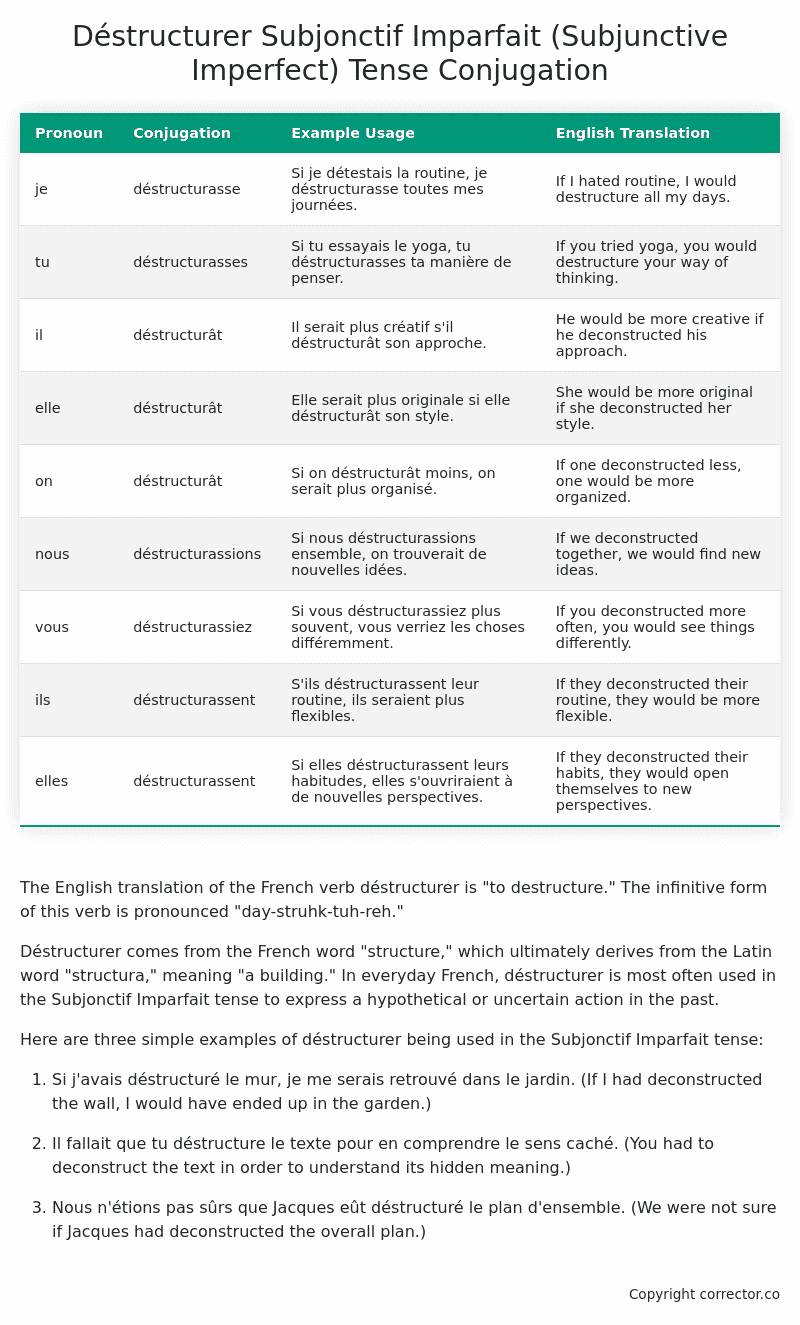Subjonctif Imparfait (Subjunctive Imperfect) Tense Conjugation of the French Verb déstructurer
Introduction to the verb déstructurer
The English translation of the French verb déstructurer is “to destructure.” The infinitive form of this verb is pronounced “day-struhk-tuh-reh.”
Déstructurer comes from the French word “structure,” which ultimately derives from the Latin word “structura,” meaning “a building.” In everyday French, déstructurer is most often used in the Subjonctif Imparfait tense to express a hypothetical or uncertain action in the past.
Here are three simple examples of déstructurer being used in the Subjonctif Imparfait tense:
-
Si j’avais déstructuré le mur, je me serais retrouvé dans le jardin. (If I had deconstructed the wall, I would have ended up in the garden.)
-
Il fallait que tu déstructure le texte pour en comprendre le sens caché. (You had to deconstruct the text in order to understand its hidden meaning.)
-
Nous n’étions pas sûrs que Jacques eût déstructuré le plan d’ensemble. (We were not sure if Jacques had deconstructed the overall plan.)
Table of the Subjonctif Imparfait (Subjunctive Imperfect) Tense Conjugation of déstructurer
| Pronoun | Conjugation | Example Usage | English Translation |
|---|---|---|---|
| je | déstructurasse | Si je détestais la routine, je déstructurasse toutes mes journées. | If I hated routine, I would destructure all my days. |
| tu | déstructurasses | Si tu essayais le yoga, tu déstructurasses ta manière de penser. | If you tried yoga, you would destructure your way of thinking. |
| il | déstructurât | Il serait plus créatif s’il déstructurât son approche. | He would be more creative if he deconstructed his approach. |
| elle | déstructurât | Elle serait plus originale si elle déstructurât son style. | She would be more original if she deconstructed her style. |
| on | déstructurât | Si on déstructurât moins, on serait plus organisé. | If one deconstructed less, one would be more organized. |
| nous | déstructurassions | Si nous déstructurassions ensemble, on trouverait de nouvelles idées. | If we deconstructed together, we would find new ideas. |
| vous | déstructurassiez | Si vous déstructurassiez plus souvent, vous verriez les choses différemment. | If you deconstructed more often, you would see things differently. |
| ils | déstructurassent | S’ils déstructurassent leur routine, ils seraient plus flexibles. | If they deconstructed their routine, they would be more flexible. |
| elles | déstructurassent | Si elles déstructurassent leurs habitudes, elles s’ouvriraient à de nouvelles perspectives. | If they deconstructed their habits, they would open themselves to new perspectives. |
Other Conjugations for Déstructurer.
Le Present (Present Tense) Conjugation of the French Verb déstructurer
Imparfait (Imperfect) Tense Conjugation of the French Verb déstructurer
Passé Simple (Simple Past) Tense Conjugation of the French Verb déstructurer
Passé Composé (Present Perfect) Tense Conjugation of the French Verb déstructurer
Futur Simple (Simple Future) Tense Conjugation of the French Verb déstructurer
Futur Proche (Near Future) Tense Conjugation of the French Verb déstructurer
Plus-que-parfait (Pluperfect) Tense Conjugation of the French Verb déstructurer
Passé Antérieur (Past Anterior) Tense Conjugation of the French Verb déstructurer
Futur Antérieur (Future Anterior) Tense Conjugation of the French Verb déstructurer
Subjonctif Présent (Subjunctive Present) Tense Conjugation of the French Verb déstructurer
Subjonctif Passé (Subjunctive Past) Tense Conjugation of the French Verb déstructurer
Subjonctif Imparfait (Subjunctive Imperfect) Tense Conjugation of the French Verb déstructurer (this article)
Conditionnel Présent (Conditional Present) Tense Conjugation of the French Verb déstructurer
Conditionnel Passé (Conditional Past) Tense Conjugation of the French Verb déstructurer
L’impératif Présent (Imperative Present) Tense Conjugation of the French Verb déstructurer
L’infinitif Présent (Infinitive Present) Tense Conjugation of the French Verb déstructurer
Struggling with French verbs or the language in general? Why not use our free French Grammar Checker – no registration required!
Get a FREE Download Study Sheet of this Conjugation 🔥
Simply right click the image below, click “save image” and get your free reference for the déstructurer Subjonctif Imparfait tense conjugation!

Déstructurer – About the French Subjonctif Imparfait (Subjunctive Imperfect) Tense
Formation
Common Everyday Usage Patterns
Interactions with Other Tenses
Subjonctif Présent
Indicatif Passé Composé
Conditional
Conditional Perfect
Summary
I hope you enjoyed this article on the verb déstructurer. Still in a learning mood? Check out another TOTALLY random French verb conjugation!


